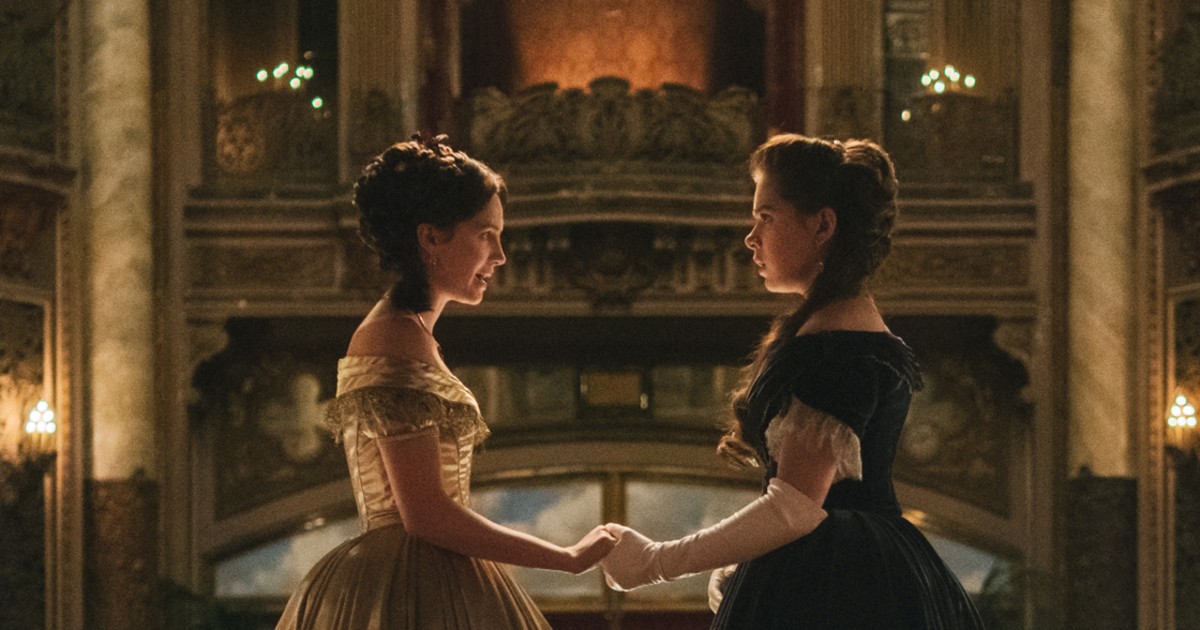
Hailee Steinfeld has always been impressed with the uncanny ability of “Dickinson” to tap into more contemporary concerns against the backdrop of 19th-century Massachusetts. But for the third and final season, Steinfeld — who serves as a star and executive producer of the hit Apple TV+ series — was particularly struck by the parallels that could be drawn between the American Civil War of the 1860s and the collective grief and racial reckoning of last year.
“It’s one of the things I love most about this show,” Steinfeld told NBC News. “I just feel lucky to be a part of a show that took so many creative risks and tackled so many of these subjects head-on, and I hope that it sparks conversations for people. I hope it makes them think; I hope it makes them feel seen. I hope that this show can also be a source of hope and light.”
Created by Alena Smith (“The Newsroom,” “The Affair”), “Dickinson” is a half-hour comedy series that audaciously explores the constraints of society, gender and family from the perspective of the renowned — and rebellious — American poet Emily Dickinson (played by Steinfeld).
In the final 10-episode season, which is set in 1862, Emily must contend with two civil wars: the one dividing her nation and the one threatening to tear apart her own family. As she tries to mend the fences around her, she struggles to feel useful to the war effort, wondering if her poetry — and art at large — can keep hope alive in a divided country and whether the future can be better than the past.
“With each season, Emily has had to sort of find an answer to a different question all relating back to her writing, of course,” Steinfeld explained, referring to her desire to be recognized as a writer in the freshman season and her complicated relationship with fame in the sophomore season.
Throughout her life, the real-life Dickinson wrote nearly 1,800 poems, most of which were published posthumously by her family and closest acquaintances in multiple volumes. But in the years of the Civil War, she “reached her greatest heights as a poet,” Steinfeld said in a voiceover at the start of the third season.
“She wrote furiously in those years, at a pace and intensity unmatched before or after — nearly a poem a day,” Steinfeld’s voiceover continued. “Her work of this period has been called a great and classic descent into a personal inferno. Yet, due to her life of seclusion, Dickinson has not traditionally been considered a war poet.”
For Steinfeld, the fact that Dickinson “was able to feel so deeply that loss and that pain that was happening without being physically on the front lines” is a testament to her creative genius.
“One thing I love and I think is so important about this season is that it sort of tells you that you don’t necessarily have to be on those front lines to be affected, and feel like you can still make a change and still be a source of light and hope in your own way, and Emily, ultimately, does find that she can be through her writing,” she said.
The events of Dickinson’s life have been the subject of many debates due to her relative isolation, but there is a general consensus among scholars that her closest friend and adviser was another writer and poet named Susan “Sue” Gilbert (played by Ella Hunt), who was also her sister-in-law. While Dickinson frequently described her love for Gilbert in various letters and poems, the exact nature of their relationship has not been ascertained. But in Apple TV+’s radical take on the famed poet’s life story — which Steinfeld said is more of “an interpretation of her poetry” rather than “a straightforward biopic” — Emily and Sue share an inextricable romantic connection, which culminated in a raw and volatile argument, an emotional declaration of requited love, and a sensual and passionate reunion at the end of the second season.
“I love their relationship and where it goes in this season, because it’s a lot more mature and a lot more complicated, even when you thought maybe it couldn’t have got more complicated,” Steinfeld said with a laugh. “They’re in a place now where Sue is pushing Emily to really take ownership of who she is outside of just being with Sue. They’ve only ever known being their truest selves when they’re together, and when they enter the wider world, Sue is just trying to push Emily to live her life unapologetically, and she does that. It’s this beautiful, messy relationship that I have loved every second of being able to play through and discover.”
Like Steinfeld, Hunt didn’t know very much about Dickinson or her relationship with Gilbert. But after landing the role, Hunt — who said her “research has evolved from season to season” — began with “researching the letters between Emily and Sue and reading their dialogue, which is so eye-opening, and I find new things in their letters each season,” she said.
Hunt also said she found inspiration in the 2016 biography “A Loaded Gun: Emily Dickinson for the 21st Century” by Jerome Charyn. The book — named after one of Dickinson’s poems — allows readers to see her work and life, including her relationship with Gilbert, “through what we know of the world now and our current-day terminologies,” Hunt explained.
In the final installment, Hunt previewed, Sue is entering a completely new chapter of her life.
“For the first time ever, she is allowing herself to accept and give love to the person she loves most in the world — Emily — and that love is opening up new doors within Sue,” she said. “She is more playful, more at ease and messier than we have ever seen her before … She’s asking for what she wants this season; she’s allowing herself the autonomy of asking for what she wants and feeling her desire. There’s a lot to grapple with, but I think it’s probably Emily and Sue’s most tender and deep of seasons.”
In the last couple of years, Steinfeld and Hunt have both received a tremendous amount of support from fans around the world, who have gravitated toward Emily and Sue’s relationship — or “EmiSue” — with a fiery passion. When the show premiered in November 2019, Hunt said that she didn’t expect to receive such a warm response from the LGBTQ community in particular, but “it has been so beautiful seeing how seen people have felt by this dynamic between the two of them,” she said. “Hailee and I take that LGBTQ community’s embrace of us with the awareness that it is a huge responsibility, and we are as thoughtful as we can be in how we approach these characters.”
“What has been so fabulous for me as a young person, in my own personal identity journey, has been learning about queer history over the course of this job and over the course of the three seasons of this show, and I’m still learning,” added Hunt, who came out as queer in March. “There’s a very special moment this season where Emily travels into her brain and into a Civil War hospital with Walt Whitman, and he takes her to Pfaff’s, which was one of the first underground gay bars. And just learning about Pfaff’s and learning that there were these very secret spaces for queerness, even in 1860, I found, was so eye-opening and exciting to see.”
As they reflected on the trajectory of Emily and Sue’s love story, Steinfeld and Hunt naturally sang each other’s praises, acknowledging that they would both like to work together again in the future.
“I’m so proud of what we have built together, and every time we come on to set, I feel safer, freer, more able to explore,” Hunt said. “We just have the best conversations, and I’m just completely in awe of Hailee. I think that everyone will be at the end of season 3. She does an extraordinary thing this season.”
Steinfeld echoed the same sentiments: “I feel so grateful to have played through this relationship with Ella. She is a phenomenal actress, and the work she did in season three just blew me away. I found that I would have to remind myself that I was a part of the scene that she was in, because I would absolutely get lost in just watching her performance.”
In collaborating with Hunt and Smith on the evolution of Emily and Sue’s relationship, Steinfeld said that she felt they “were able to deliver something that felt very real and very honest. And this show has always been about that, and seeing and being seen for who you truly are and being accepted. I hope that, in one way or another, people can watch this show and see themselves reflected in it, whether it’d be through Sue or Emily or any other aspect in the show.”
After screening the final season, Hunt posted a tearful photo on Twitter, but she wanted to assure viewers that she was crying tears of joy, release and relief.
“I’m so proud to have seen Alena’s vision of this show fully realized, and it’s emotional watching especially how Hailee, Anna [Baryshnikov], Adrian [Blake Enscoe] and I have grown up within this show,” she told NBC News. “It has been a foundational experience for me. When I started this show, I had just turned 20, I had just moved to New York. I didn’t know who I was, who I wanted to be, how I wanted to identify … But this show has provided a safe space for me to discover myself and this season, for Sue and for me, I am in full bloom. I feel like I know who I am, and I’m ready to take on the next journey knowing that I will always have Hailee, Anna and Adrian to turn to when I need to feel that support and safety. That lives on after the show.”
For Steinfeld, the end of her run as Dickinson “feels very bittersweet,” but she said she has grown tremendously not only as an actor and a producer, but also as a young woman.
“I think I will just walk away from this experience being forever grateful and forever inspired by her work and her ability to just live her life how she wanted and not take no for an answer and continue marching on,” she said. “By the end of this thing, she is looking into the most hopeful future that she could possibly envision.”
The first three episodes of the third season of “Dickinson” will premiere Friday on Apple TV+, with a new episode premiering weekly thereafter through Dec. 24.
Follow NBC Out on Twitter, Facebook & Instagram
Source: | This article originally belongs to Nbcnews.com










